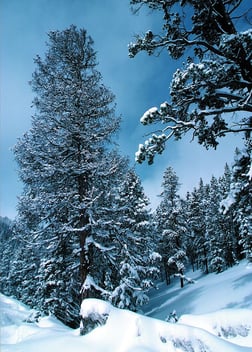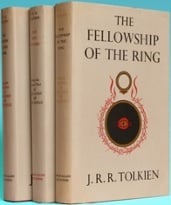Winter, let us say, has its detractors. Beyond a certain latitude, the Winter Solstice is a symbol of minimal sunlight, bracing cold, and brutal snowstorms. This does not mean that the season has nothing to recommend it. The colder months offer the opportunity to stay in, drink hot cocoa, and watch something seasonal or festive, say, It's a Wonderful Life (1946). And really, snow’s not so bad if you’re watching it fall from the comfort of your own home. Here are four strategies for reading around the winter solstice.
1. Lean Into It
 For most of us, it will be cold. And reading is meant to help one engage with the real world—so what better opportunity to read books that seem to breathe frigid air off of every page? Many of these will be by Russians. Consider reading Fyodor Dostoevsky’s The Brothers Karamazov (1880) or some of Anton Chekhov’s short stories to really indulge yourself in the bleakest view of the season, combining dark existentialism with your own impending Seasonal Affective Disorder. Like Shakespeare said, “a sad tale’s best for winter.”
For most of us, it will be cold. And reading is meant to help one engage with the real world—so what better opportunity to read books that seem to breathe frigid air off of every page? Many of these will be by Russians. Consider reading Fyodor Dostoevsky’s The Brothers Karamazov (1880) or some of Anton Chekhov’s short stories to really indulge yourself in the bleakest view of the season, combining dark existentialism with your own impending Seasonal Affective Disorder. Like Shakespeare said, “a sad tale’s best for winter.”
For a slightly lighter take, you might turn toward Charles Dickens. A Christmas Carol, (1843) for instance, offers a ray of hope after its snowy romp is through. Consider its iconic ending a literary harbinger of spring.
2. On Second Thought, Just Pretend It's Summer
 If you find Dostoevsky too depressing for the shortest day of the year (and who could blame you?) you may consider a reading strategy that isn’t reliant on confronting the season’s reality head on. In fact, you might do just the opposite, breaking out classic beach reads and books that otherwise revel in the warmth. As far as the classics go, Robinson Crusoe (1719) is light, odd, and takes place almost exclusively on a desert island. Robert Louis Stevenson’s Treasure Island (1883) deserves a recommendation for similar reasons. Likewise Rudyard Kipling's The Jungle Book (1894) and Mark Twain's The Adventures of Huckleberry Finn (1884) are good options.
If you find Dostoevsky too depressing for the shortest day of the year (and who could blame you?) you may consider a reading strategy that isn’t reliant on confronting the season’s reality head on. In fact, you might do just the opposite, breaking out classic beach reads and books that otherwise revel in the warmth. As far as the classics go, Robinson Crusoe (1719) is light, odd, and takes place almost exclusively on a desert island. Robert Louis Stevenson’s Treasure Island (1883) deserves a recommendation for similar reasons. Likewise Rudyard Kipling's The Jungle Book (1894) and Mark Twain's The Adventures of Huckleberry Finn (1884) are good options.
An extension of this strategy is to delve into full-on escapism (beach reads be damned). Think of winter as an ideal excuse to read (or reread) something like C.S. Lewis's The Chronicles of Narnia (1950-1956), Dan Brown's The Da Vinci Code (2003), or your favorite James Bond novel. Come to think of it, many of these books will be a bit wintry in their own rights.
3. Go Wide With It
 Though it’s tempting to blend first day of winter reading recommendations with Christmas reading recommendations, it’s worth remembering that the Winter Solstice was, for eons, a night of pagan celebration. With that in mind, you could think outside of the trappings of the season and instead focus on the kind of mysticism and magic that we associate, on some level, with, say, the Druids. To that end, something in the realm of fantasy would probably be your best bet. Tolkien's The Lord of the Rings (1954) is a perennial pick for a reason. Or you could err on the side of more modern fantasy with something like Susanna Clarke's Jonathan Strange and Mr. Norrell (2004) or Patrick Rothfuss's The Name of the Wind (2007).
Though it’s tempting to blend first day of winter reading recommendations with Christmas reading recommendations, it’s worth remembering that the Winter Solstice was, for eons, a night of pagan celebration. With that in mind, you could think outside of the trappings of the season and instead focus on the kind of mysticism and magic that we associate, on some level, with, say, the Druids. To that end, something in the realm of fantasy would probably be your best bet. Tolkien's The Lord of the Rings (1954) is a perennial pick for a reason. Or you could err on the side of more modern fantasy with something like Susanna Clarke's Jonathan Strange and Mr. Norrell (2004) or Patrick Rothfuss's The Name of the Wind (2007).









